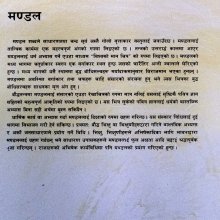Bhikshu, Bhikṣu: 26 definitions
Introduction:
Bhikshu means something in Buddhism, Pali, Hinduism, Sanskrit, Jainism, Prakrit, the history of ancient India, Marathi, Hindi, biology. If you want to know the exact meaning, history, etymology or English translation of this term then check out the descriptions on this page. Add your comment or reference to a book if you want to contribute to this summary article.
The Sanskrit term Bhikṣu can be transliterated into English as Bhiksu or Bhikshu, using the IAST transliteration scheme (?).
Images (photo gallery)
In Hinduism
Purana and Itihasa (epic history)
Source: archive.org: Shiva Purana - English TranslationBhikṣu (भिक्षु) refers to “beggars”, according to the Śivapurāṇa 2.3.7.—Accordingly, after the Goddess (Umā/Śivā) incarnated as Pārvatī by becoming the daughter of Menā:—“[...] The goddess of great brilliance assumed the form of her baby child in front of Menā and began to cry in accordance with the ways of the world. [...] Himavat came to the outer gate of the palace and joined the festivities. With a delighted mind he distributed monetary gifts to the beggars [i.e., bhikṣu]. In an auspicious hour, in the company of the sages, Himavat named his daughter Kālī and assigned other pleasing names to her. He gave charitable gifts to the brahmins out of love and respect. Varieties of festivities were gone through with suitable music. [...]”.
Source: Cologne Digital Sanskrit Dictionaries: The Purana Index1a) Bhikṣu (भिक्षु).—(mārga) taught by Nārada to the children of Dakṣa;1 duties of.2
1b) (see also Yati) main vratas five; and supplementary, five; main:—dhyānam, samādhi of the senses, begging at seven houses, silence and release from sangha. Supplementary:—Purity in conduct, discipline (vinaya) śaucam, non-retaliation and samyakdarśanam, besides non theft, Brahmacarya, non-covetousness, ahiṃsa, non-anger, service to the Guru, medicated food, daily study, alms, resig nation, generosity, etc., becomes one with Brahmā for observing such dharma.*
- * Brahmāṇḍa-purāṇa II. 7. 179; Vāyu-purāṇa 8. 186-7; 16. 18-9; 59. 25; 105. 25; Viṣṇu-purāṇa III. 9. 24-42.

The Purana (पुराण, purāṇas) refers to Sanskrit literature preserving ancient India’s vast cultural history, including historical legends, religious ceremonies, various arts and sciences. The eighteen mahapuranas total over 400,000 shlokas (metrical couplets) and date to at least several centuries BCE.
Vedanta (school of philosophy)
Source: Shodhganga: Siva Gita A Critical StudyBhikṣu (भिक्षु) or Bhikṣugītā refers to one of the sixty-four Gītās commonly referred to in Hindu scriptures.—Gītā is the name given to certain sacred writings in verse (often in the form of a dialogue) which are devoted to the exposition of particular religious and theosophical doctrines. Most of these Gītās [i.e., Bhikṣu-gītā] originate from the Mahābhārata or the various Purāṇas.

Vedanta (वेदान्त, vedānta) refers to a school of orthodox Hindu philosophy (astika), drawing its subject-matter from the Upanishads. There are a number of sub-schools of Vedanta, however all of them expound on the basic teaching of the ultimate reality (brahman) and liberation (moksha) of the individual soul (atman).
Ayurveda (science of life)
Nighantu (Synonyms and Characteristics of Drugs and technical terms)
Source: WorldCat: Rāj nighaṇṭuBhikṣu (भिक्षु) is another name for Śrāvaṇī, an unidentified medicinal plant, according to verse 5.17-18 of the 13th-century Raj Nighantu or Rājanighaṇṭu. The fifth chapter (parpaṭādi-varga) of this book enumerates sixty varieties of smaller plants (kṣudra-kṣupa). Together with the names Bhikṣu and Śrāvaṇī, there are a total of eight Sanskrit synonyms identified for this plant.

Āyurveda (आयुर्वेद, ayurveda) is a branch of Indian science dealing with medicine, herbalism, taxology, anatomy, surgery, alchemy and related topics. Traditional practice of Āyurveda in ancient India dates back to at least the first millenium BC. Literature is commonly written in Sanskrit using various poetic metres.
Shaktism (Shakta philosophy)
Source: Google Books: ManthanabhairavatantramBhikṣu (भिक्षु) refers to a “mendicant monk”, according to the 16th century Śaivāgamaparibhāṣāmañjarī, a compendium of extracts from the Siddhāntāgamas written by Siddhāntin Vedajñāna.—The theme of the observances (āśrama) recurs frequently in the Śaivāgamaparibhāṣāmañjarī; the recognized observances are that of the householder, the mendicant monk (bhikṣu), the brahmacārin and the forest dwelling ascetic (ibid. 4/31-33ab), but this basic list is qualified by dichotomies within each of the observances and, moreover, by categories that are superimposed on the aforementioned four:... this is particularly the case with the yatins, that is, those who have mastered their senses and can be exempted from the four observances

Shakta (शाक्त, śākta) or Shaktism (śāktism) represents a tradition of Hinduism where the Goddess (Devi) is revered and worshipped. Shakta literature includes a range of scriptures, including various Agamas and Tantras, although its roots may be traced back to the Vedas.
Jyotisha (astronomy and astrology)
Source: Wisdom Library: Brihat Samhita by VarahamihiraBhikṣu (भिक्षु) [=Bhikṣuka?] refers to “ascetics”, according to the Bṛhatsaṃhitā (chapter 10), an encyclopedic Sanskrit work written by Varāhamihira mainly focusing on the science of ancient Indian astronomy astronomy (Jyotiṣa).—Accordingly, “If the course of Saturn should lie through the constellation of Āśleṣā, the creatures of water and serpents will suffer; if through the constellation of Maghā, the Bāhlīkas, the Cīna (Chinese), the people of Gāndhāra, of Śūlika, of Pārata, the Vaiáyas, store houses and merchants will suffer. If his course should lie through the constellation of Pūrvaphālguni, juice-sellers, prostitutes, virgins and the people of Mahāraṣṭras will suffer miseries; if through Uttaraphālguni, kings, ascetics [i.e., bhikṣuka], jaggery, salt, water and the town of Takṣaśilā will suffer”.

Jyotisha (ज्योतिष, jyotiṣa or jyotish) refers to ‘astronomy’ or “Vedic astrology” and represents the fifth of the six Vedangas (additional sciences to be studied along with the Vedas). Jyotisha concerns itself with the study and prediction of the movements of celestial bodies, in order to calculate the auspicious time for rituals and ceremonies.
In Buddhism
Mahayana (major branch of Buddhism)
Source: Wisdom Library: Maha Prajnaparamita SastraBhikṣu (भिक्षु) refers to a “mendicant” according to the 2nd century Mahāprajñāpāramitāśāstra chapter VI. What is a bhikṣu?
1) He is called bhikṣu because of his pure means of livelihood... One is called bhikṣu in accordance with this pure means of livelihood which consists of begging one’s food.
2) Furthermore, bhi means to cut (bhid) and kṣu means afflictions (kṣud = kleśa). The person who has cut the afflictions is called bhikṣu.
3) Furthermore, the monk who has gone forth from home (pravrajita) is called bhikṣu. It is like the eastern (Hou), Chinese (Han) and Tibetan slaves who each have their name.
4) Furthermore, the one who says, from ordination (upasaṃpad) onward: “I, the bhikṣu so-and-so, will observe the precepts (śīla) for my whole life.”
5) Furthermore, bhi means to frighten (bhī) and kṣu means ability (kṣam). The one who has the power to frighten Māra and his followers is called bhikṣu.
Source: academia.edu: A Study and Translation of the GaganagañjaparipṛcchāBhikṣu (भिक्षु) refers to a “monk”, according to the Gaganagañjaparipṛcchā: the eighth chapter of the Mahāsaṃnipāta (a collection of Mahāyāna Buddhist Sūtras).—Accordingly, as Śrīgupta said to the Lord: “[...] O Lord, as I do not have any worldly attachment (amama) nor property (aparigraha), I pray that I may leave the world for the well-explained discipline, be ordained (upasampada), and obtain the way as a monk (i.e., Bhikṣu)”.

Mahayana (महायान, mahāyāna) is a major branch of Buddhism focusing on the path of a Bodhisattva (spiritual aspirants/ enlightened beings). Extant literature is vast and primarely composed in the Sanskrit language. There are many sūtras of which some of the earliest are the various Prajñāpāramitā sūtras.
General definition (in Buddhism)
Source: Buddhist Door: GlossaryBhiksuni in Sanskrit, Bhikkhuni in Pali. A nun observing more strict rules than a Bhiksu. See also Bhiksu.
In Jainism
General definition (in Jainism)
Source: archive.org: Jaina YogaBhikṣu (भिक्षु) refers to the last of the four stages of a layman (āśrama) according to Cāmuṇḍarāya (940–989 A.D.) in his Caritra-sāra. Cāmuṇḍarāya, who was a Digambara Jain, has taken over the Hindu concept of the four āśramas, which, following Jinasena, he terms brahmacārin, gṛhastha, vānaprastha, and bhikṣu.
The following categories of Bhikṣu are mentioned in the Caritra-sāra:
- anagāra,
- yati,
- muni,
- ṛṣi.
According to Medhāvin (fifteenth century) the vānaprastha—here equivalent to a kṣullaka—is also styled apavāda-liṅgin and the bhikṣu (as) utsarga-liṅgin.

Jainism is an Indian religion of Dharma whose doctrine revolves around harmlessness (ahimsa) towards every living being. The two major branches (Digambara and Svetambara) of Jainism stimulate self-control (or, shramana, ‘self-reliance’) and spiritual development through a path of peace for the soul to progess to the ultimate goal.
India history and geography
Source: Cologne Digital Sanskrit Dictionaries: Indian Epigraphical GlossaryBhikṣu.—(EI 7, 21; CII 3; ML), Buddhist monk, also called Śākya-bhikṣu. Note: bhikṣu is defined in the “Indian epigraphical glossary” as it can be found on ancient inscriptions commonly written in Sanskrit, Prakrit or Dravidian languages.

The history of India traces the identification of countries, villages, towns and other regions of India, as well as mythology, zoology, royal dynasties, rulers, tribes, local festivities and traditions and regional languages. Ancient India enjoyed religious freedom and encourages the path of Dharma, a concept common to Buddhism, Hinduism, and Jainism.
Biology (plants and animals)
Source: Google Books: CRC World Dictionary (Regional names)1) Bhikshu in India is the name of a plant defined with Hygrophila auriculata in various botanical sources. This page contains potential references in Ayurveda, modern medicine, and other folk traditions or local practices It has the synonym Asteracantha longifolia Nees (among others).
2) Bhikshu is also identified with Sphaeranthus indicus It has the synonym Sphaeranthus hirtus Willd. (etc.).
Example references for further research on medicinal uses or toxicity (see latin names for full list):
· Nat. Hist. (1877)
· Centuria II. Plantarum (1759)
· Regnum Vegetabile, or ‘a Series of Handbooks for the Use of Plant Taxonomists and Plant Geographers’ (1993)
· Taxon (1981)
· Glimpses of Cytogenetics in India (1992)
· Berichte der Schweizerischen Botanischen Gesellschaft (1976)
If you are looking for specific details regarding Bhikshu, for example chemical composition, extract dosage, diet and recipes, pregnancy safety, side effects, health benefits, have a look at these references.

This sections includes definitions from the five kingdoms of living things: Animals, Plants, Fungi, Protists and Monera. It will include both the official binomial nomenclature (scientific names usually in Latin) as well as regional spellings and variants.
Languages of India and abroad
Marathi-English dictionary
Source: DDSA: The Molesworth Marathi and English Dictionarybhikṣu (भिक्षु).—m S bhikṣuka m (S) A Brahman of the fourth or mendicant order; one that subsists upon alms and gifts and employs himself in sacred studies and duties. 2 A beggar in general.
Source: DDSA: The Aryabhusan school dictionary, Marathi-Englishbhikṣu (भिक्षु).—m A Brahman beggar; a beggar.
Marathi is an Indo-European language having over 70 million native speakers people in (predominantly) Maharashtra India. Marathi, like many other Indo-Aryan languages, evolved from early forms of Prakrit, which itself is a subset of Sanskrit, one of the most ancient languages of the world.
Sanskrit dictionary
Source: DDSA: The practical Sanskrit-English dictionaryBhikṣu (भिक्षु).—[bhikṣ-un]
1) A beggar, mendicant in general; भिक्षां च भिक्षवे दद्यात् (bhikṣāṃ ca bhikṣave dadyāt) Manusmṛti 3.94.
2) A religious mendicant, a Brāhmaṇa in the fourth order of his religious life (when he quits his house and family and lives only on alms), a Sannyāsin.
3) The fourth order stage in the religious life of a Brāhmaṇa (saṃnyāsa).
4) A Buddhist mendicant.
Derivable forms: bhikṣuḥ (भिक्षुः).
Source: Cologne Digital Sanskrit Dictionaries: Shabda-Sagara Sanskrit-English DictionaryBhikṣu (भिक्षु).—m.
(-kṣuḥ) The mendicant; the Hindu who has entered the fourth order and subsists wholly upon alms. 2. The fourth order of the Hindus. 3. A Baudd'ha mendicant. E. bhikṣ to beg, aff. un .
Source: Cologne Digital Sanskrit Dictionaries: Benfey Sanskrit-English DictionaryBhikṣu (भिक्षु).—[bhikṣ + u], m. 1. A mendicant; one who subsists only upon alms, [Pañcatantra] v. [distich] 55. 2. A religious mendicant, [Hitopadeśa] iii. [distich] 104
Source: Cologne Digital Sanskrit Dictionaries: Cappeller Sanskrit-English DictionaryBhikṣu (भिक्षु).—[masculine] beggar, religious mendicant, [especially] a Brahman in the last stage of his life, also a Buddhist mendicant.
Source: Cologne Digital Sanskrit Dictionaries: Aufrecht Catalogus Catalogorum1) Bhikṣu (भिक्षु) as mentioned in Aufrecht’s Catalogus Catalogorum:—pupil of Rāmacandra Sarasvatī, praśiṣya of Sarvajña Sarasvatī: Candrikodgāra Vedāntasiddhāntacandrikāṭīkā. Praṇavakalpaprakāśa. L. 2291. Vedāntasiddhāntasūktimañjarī and its Prakāśa. Io. 1597. Hall. p. 153. L. 524. K. 136. Oudh. 1877, 44 (
—[commentary]). Sāmrājyasiddhi and—[commentary]. B. 4, 84 (Mokṣasāmrājyasiddhi). Bhk. 31. Siddhāntabinduśīkara Siddhāntaleśaṭīkā. [[Oudh 1876-1877]-1877], 24. Siddhāntaleśasaṃgraha and—[commentary]. B. 4, 106. Svārājyasiddhi and—[commentary]. Kaivalyakalpadruma (composed in 1827).
Bhikṣu has the following synonyms: Gaṅgādhara yati, Sarasvatī, Gaṅgādharendra yati.
2) Bhikṣu (भिक्षु):—poet. [Sūktikarṇāmṛta by Śrīdharadāsa]
3) Bhikṣu (भिक्षु):—pupil of Surendratīrtha: Appayyakapolacapeṭikā. Ānandatāratamyavāda or Ānandatāratamyavādārtha. Āmoda Nyāyāmṛtaṭīkā. Upasaṃhāravijaya. Candrikodāhṛtanyāyavivaraṇa, a
—[commentary] on the Tātparyacandrikā of Vyāsatīrtha. See Brahmasūtrabhāṣya by Ānandatīrtha. Paratattvaprakāśikā.
Bhikṣu has the following synonyms: Vijayīndra yatīndra.
4) Bhikṣu (भिक्षु):—pupil of Surendra: Pañcasaṃskāradīpikā. Madhvatantramukhabhūṣaṇa.
Bhikṣu has the following synonyms: Vijayīndra yatīndra.
Source: Cologne Digital Sanskrit Dictionaries: Monier-Williams Sanskrit-English Dictionary1) Bhikṣu (भिक्षु):—[from bhikṣ] m. a beggar, mendicant, religious m° ([especially] a Brāhman in the fourth Āśrama or period of his life, when he subsists entirely on alms), [Manu-smṛti; Mahābhārata] etc. (cf. [Religious Thought and Life in India 55 n. 1])
2) [v.s. ...] a Buddhist mendicant or monk, [Kathāsaritsāgara; Lalita-vistara] (cf. [Monier-Williams’ Buddhism 55])
3) [v.s. ...] a [particular] Buddha, [cf. Lexicographers, esp. such as amarasiṃha, halāyudha, hemacandra, etc.]
4) [v.s. ...] Asteracantha Longifolia, [cf. Lexicographers, esp. such as amarasiṃha, halāyudha, hemacandra, etc.]
5) [v.s. ...] Sphaerantus Mollis, [cf. Lexicographers, esp. such as amarasiṃha, halāyudha, hemacandra, etc.]
6) [v.s. ...] Name of an Āṅgirasa (author of [Ṛg-veda x, 117]), [Ṛgveda-anukramaṇikā]
7) [v.s. ...] of a son of Bhoja, [Rājataraṅgiṇī]
8) [v.s. ...] of a poet, [Catalogue(s)]
9) [v.s. ...] n. Name of an Upaniṣad (cf. bhikṣukopaniṣad),
Source: Cologne Digital Sanskrit Dictionaries: Yates Sanskrit-English DictionaryBhikṣu (भिक्षु):—(kṣuḥ) 2. m. A mendicant; the 4th order of the Hindus.
Source: DDSA: Paia-sadda-mahannavo; a comprehensive Prakrit Hindi dictionary (S)Bhikṣu (भिक्षु) in the Sanskrit language is related to the Prakrit word: Bhikkhu.
[Sanskrit to German]
Sanskrit, also spelled संस्कृतम् (saṃskṛtam), is an ancient language of India commonly seen as the grandmother of the Indo-European language family (even English!). Closely allied with Prakrit and Pali, Sanskrit is more exhaustive in both grammar and terms and has the most extensive collection of literature in the world, greatly surpassing its sister-languages Greek and Latin.
Hindi dictionary
Source: DDSA: A practical Hindi-English dictionaryBhikṣu (भिक्षु):—(nm) a beggar; Buddhist mendicant; hence ~[ṇī] (nf).
...
Kannada-English dictionary
Source: Alar: Kannada-English corpusBhikṣu (ಭಿಕ್ಷು):—
1) [noun] a man who begs or asks for charity; he who lives by begging.
2) [noun] a man who is detached from worldly affairs and living by begging; a mendicant.
3) [noun] a Bhuddhist or Jaina monk.
Kannada is a Dravidian language (as opposed to the Indo-European language family) mainly spoken in the southwestern region of India.
See also (Relevant definitions)
Starts with (+17): Bhikshu-hala, Bhikshubhava, Bhikshucarya, Bhikshucharya, Bhikshudeva, Bhikshugita, Bhikshugparivraji, Bhikshuhala-parihara, Bhikshuk, Bhikshuka, Bhikshukanci Dhama, Bhikshukasati, Bhikshuki, Bhikshukiparaka, Bhikshukopanishad, Bhikshukula, Bhikshuni, Bhikshuni-sangha, Bhikshunika, Bhikshunikarmavacana.
Ends with (+7): Bauddhabhikshu, Cidananda bhikshu, Dahara-bhikshu, Deshyabhikshu, Jayatirthabhikshu, Jnanabhikshu, Jnanendra bhikshu, Kamalakarabhikshu, Kapatabhikshu, Kaviraja bhikshu, Kavirajabhikshu, Kubhikshu, Madhavabhikshu, Mahabhikshu, Narayanabhikshu, Pandarabhikshu, Rameshvara shivayogibhikshu, Samjnabhikshu, Samkhyabhikshu, Shakyabhikshu.
Full-text (+394): Bhikshuka, Bhikshusamghati, Amogharaja, Shvetabhikshu, Khadiravanika, Bhikshutattva, Bhikshu-hala, Kasphila, Bhikkhu, Bhikshucarya, Samgha, Ratnacandramati, Kakkula, Madhavabhikshu, Mahasthavira, Bhikshusutra, Mahabhikshu, Nastakarana, Jayatirtha, Shakyabhikshu.
Relevant text
Search found 126 books and stories containing Bhikshu, Bhikṣu, Bhiksu; (plurals include: Bhikshus, Bhikṣus, Bhiksus). You can also click to the full overview containing English textual excerpts. Below are direct links for the most relevant articles:
Mahayana Mahaparinirvana Sutra
Chapter V - On the Adamantine Body < [Section One]
Chapter IX - On Wrong and Right < [Section One]
Chapter IV - On Long Life < [Section One]
Maha Prajnaparamita Sastra (by Gelongma Karma Migme Chödrön)
Part 3 - Explanation of the word Bhikṣu < [Chapter VI - The Great Bhikṣu Saṃgha]
Appendix 2 - The story of Hastaka Śākyaputra < [Chapter LII - Elimination of the Triple Poison]
Appendix 8 - Permission for monks to wear fine robes (cīvara) < [Chapter XLI - The Eighteen Special Attributes of the Buddha]
Vinaya Pitaka (1): Bhikkhu-vibhanga (the analysis of Monks’ rules) (by I. B. Horner)
Translation of the term brāhmaṇa (brahmin) < [Translator’s Introduction]
Translation of the term bhikkhu < [Translator’s Introduction]
A Record of Buddhistic Kingdoms (by Fa-Hien)
Chapter VIII - Woo-chang, Or Udyana
Chapter XXX - The Srataparna Cave, Or Cave Of The First Council
A History of Indian Philosophy Volume 1 (by Surendranath Dasgupta)
Part 5 - Sāṃkhya kārikā, Sāṃkhya sūtra, Vācaspati Miśra and Vijñāna Bhiksu < [Chapter VII - The Kapila and the Pātañjala Sāṃkhya (yoga)]
Part 3 - Sāṃkhya and Yoga Literature < [Chapter VII - The Kapila and the Pātañjala Sāṃkhya (yoga)]
Part 16 - Change as the formation of new collocations < [Chapter VII - The Kapila and the Pātañjala Sāṃkhya (yoga)]
The Linga Purana (by J. L. Shastri)
Chapter 90 - The expiatory rites of the ascetics (yati-prāyaścitta) < [Section 1 - Uttarabhāga]
Chapter 6 - The origin and activities of Alakṣmī < [Section 2 - Pūrvabhāga]
Chapter 89 - Characteristics of good conduct (sadācāra) < [Section 1 - Uttarabhāga]
Related products




